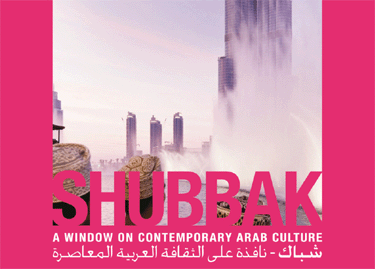| The Shattered Window |
 |
 |
| Wednesday, 24 August 2011 11:26 |
|
For almost the entire month of July, the city of London held host to its first ever festival of Arab culture – aptly named “Shubbak”, or “window” – a rare and timely opportunity to gain an insight into the people and places of the Arab world. Over the course of three weeks, this global city was transformed into a cultural melting pot as it gave voice to everything and anything Arab.
Or was it? According to Boris Johnson, quoted on the festival’s website (http://www.london.gov.uk/shubbak), “[Shubbak] is a unique chance for Londoners to glimpse the breadth and excellence of contemporary Arab culture and its influence on London's cultural scene today” – but beyond the empty rhetoric, what did this festival actually involve? How exactly did it strive to illuminate the Arab world, drawing back the curtain of obscurity for Londoners to peer in? A quick glance through the programme of events is enough to see that there was very little that actually represented “Arab culture” in any meaningful way, and that instead of an honest attempt to embrace the cultural heritage of the Middle East, the festival offered a distilled, cardboard cut-out version of regional politics and Islamic theology.
As a self-professed Arab-phile and lover of all things Middle Eastern, I was dismayed to find none of the colourful, sensual, community-driven cacophony I have come to associate with this part of the world, but found myself on the verge of boredom-induced tears listening to some undistinguished intellectual re-hash the issue of Sharia law. But the real tragedy here is not that Londoners have been deprived of the opportunity to discover the cultural delights of the Arab world (though this is tragic in itself), it is the fact that by distilling “Arab culture” down to its bare intellectual roots the Shubbak festival succeeded in abstracting Arab culture from its most human and eternal elements; thus perpetuating the pernicious “us and them” mentality that acts as a barrier to the integration of minorities in this country.
Because Britain will never be a truly multicultural nation until it learns to recognise the enduring humanity in every black, brown, yellow or white face that passes through its borders. By reducing a rich and complex cultural heritage to a few intellectual and theological doctrines, we are constructing artificial barriers between this “other” culture and our own that serve to alienate those on both sides of the fence. Just as Indian and Pakistani cultures – arguably those communities that have been most successfully integrated into British society – would be impoverished without their associated foods, music and dances, so Arabculture is predominantly about people and families interacting with each other and enjoying each other's company, rather than the more formal doctrines of Islam and Sharia. As long as British policy and attitudes focus on the latter rather than the former, we will never be able to interact with this (or any other) culture on a basis of mutual understanding. Instead, we will succeed in both alienating the indigenous British population from the seemingly strange and exotic ways of “the other” as well as the majority of Arabs and Muslims who do not live their life doctrinally according to Islamic teaching, but rather embrace it as a part of a more nuanced and encompassing way of life.
Until we come to understand different cultures and societies as merely different expressions of a universal human nature, we will continue to labour under the misapprehensions of the postmodern, counter-Enlightenment thinking which sought to build barriers between individuals on the basis of culture, religion or ethnicity. It was this thinking that inspired Samuel P. Huntington’s ‘Clash of Civilisations’, in which he prophesised that “the fault lines between civilisations will be the battlegrounds of the future.” It was also this thinking that led David Cameron to claim earlier this year that multiculturalism has failed in this country. Such spurious divisions have created a society in which immigrants and minority cultures feel marginalised and discriminated against at the same time that the majority feels encroached upon in their own back yard.
If the violence and upheaval of last week’s riots has taught us anything, it is that we are all in it together – we are all responsible for the community in which we live, and the people within it. We have lived too long with these invisible barriers, reinforced by the contemporary political and intellectual climate, it is time to take them down. The protests and revolutions across the Arab world have proved a timely reminder that dignity, justice and autonomy are essential human values that transcend the limits of culture and race. The Shubbak festival should have recognised this, rather than reverting to the old tropes of religious and cultural discrimination. However, the fact the festival took place at all is a tiny, shuffling step in the right direction. Let’s hope that next year the festival will overcome its teething problems and provide a celebration of Arab culture that affirms the similarities, rather than the differences |




